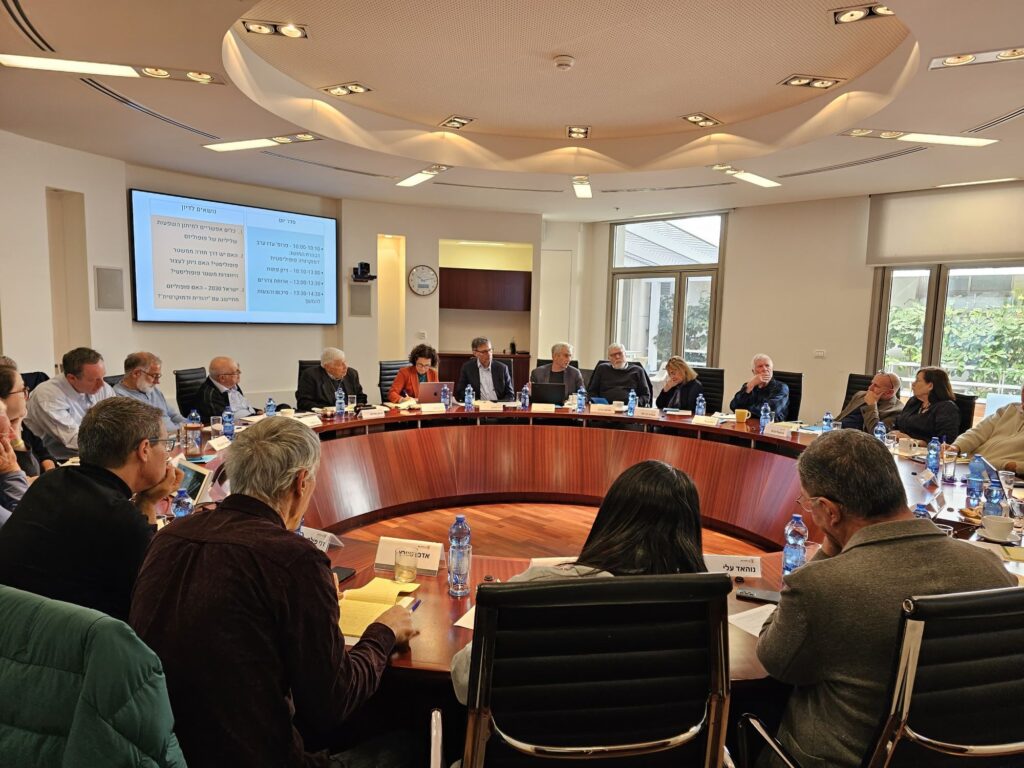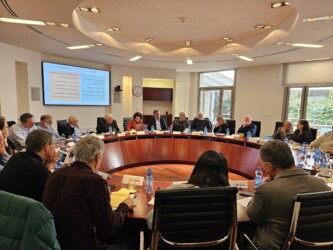The economic and social spheres are intertwined and invite a multidisciplinary discussion that relates to them and the implications deriving from government policy. The forum will focus on engaging in this integration with a macro approach, synergizing with the other content areas at the Neaman Institute, with the intention of influencing the shaping of national policy.
We will relate, inter alia, to approaches from the fields of political science and political economy, such as:
Collective Action, Public Goods, Social Dilemma, Mission-oriented policies, GDP and metrics of well-being, behavioral economics, etc. The goal is to examine the implications for the State of Israel towards 2030.
The Economics and Social Forum will strive to point out the possible contribution of academia to the discussion in the field, and thus to reflect issues and needs that will germinate research in the fields of activity of the Neaman Institute.
Some background hints:
Vincent Ostrom: “one person, one vote, majority rule is an inadequate and superficial formulation for constituting viable democratic societies”. Popular elections are necessary but not sufficient. In fact, elections, political parties, and governing coalitions can lead to social strife, chaos, and institutional collapse.
What it means to live in a democratic society is much more demanding than electing representatives who form governments. Not only are democratic societies constructed around the essential place of citizens in those societies, but they cannot be maintained without the knowledge, moral integrity, skill, and intelligibility of citizens in the cultivation of those societies. Calling all persons in all States “citizens” and all States “republics” is a misleading use of language and an erroneous way of conceptualizing political “realities”.
Joseph E. Stiglitz, Amartya Sen, and Jean-Paul Fitoussi:
In the quest to increase GDP, we may end up with a society in which citizens are worse off. Too often, we confuse ends with means …. A financial sector is a means to a more productive economy, not an end in itself. It is even worse to confuse an improvement in a measurement of well-being with an improvement in well-being itself. Our economy is supposed to increase our well-being. It too is not an end in itself.
The objective of this international Commission was to align better the metrics of well-being with what actually contributes to quality of life, and in doing so, to help all of us to direct efforts to those things that really matter.
Mariana Mazzucato: The corporate community has rediscovered an old idea: stakeholder value. The concept’s history is rooted in the literature on varieties of capitalism. Within that scholarship it has served to delineate institutional and relational differences between capitalist systems and forms of corporate governance. Today, stakeholder value is being used to argue for the redirection of capitalism to deliver on key goals related to inclusion and sustainability. This paper argues that the concept – and thus the endeavour to change capitalism – will remain weak unless it goes to the centre of how we create value. Moralistic exhortations to business leaders are not enough to bring about a true stakeholder form of capitalism. For this we must have stronger theory and practice on how to restructure finance, production, and public-private partnerships in new ways that recognise the state’s market-shaping role and support equitable distribution of value across stakeholders.
I have argued that tackling grand challenges will only happen if we reimagine government as a prerequisite for restructuring capitalism in a way that is inclusive, sustainable and driven by innovation. First and foremost, this means reinventing government for the twenty-first century – equipping it with the tools, organization and culture it needs to drive a mission-oriented approach. It also means bringing purpose to the core of corporate governance and taking a very broad stakeholder position across the economy. It means changing the relationship between public and private sectors, and between them and civil society, so they all work symbiotically for a common goal. The reason for the emphasis on rethinking government is simple: only government has the capacity to bring about transformation on the scale needed. The relationship between economic actors and civil society shows our problems at their most profound, and this is what we must unravel.


